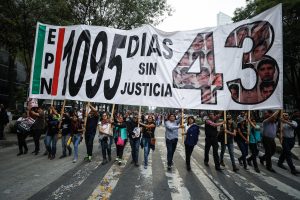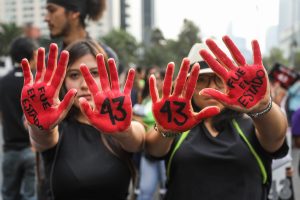 Tuesday marked three years since the search began for the 43 students disappeared in Iguala, Guerrero. It also marked one week since dozens of families began searching for their loved ones trapped in collapsed buildings after the September 19th earthquake.
Tuesday marked three years since the search began for the 43 students disappeared in Iguala, Guerrero. It also marked one week since dozens of families began searching for their loved ones trapped in collapsed buildings after the September 19th earthquake.
In a silent march from the Angel of Independence to the “Anti-Monument” to the disappeaared students at the intersection of Reforma and Bucareli, the Ayotzinapa families and hundreds of supporters sent a message of solidarity to earthquake victims and a clear signal that they have not forgotten the disappeared students from the rural teaching college in Ayotzinapa, last seen in custody of local police.
Maria Elena Guerrero, mother of disappeared student Giovani Galindo, spoke to the crowd at the Anti-Monument.
“We join them in their pain,” she said, referring to the families of the earthquake victims. “We need to unite so that we can remove the rubble of injustice.”
Three years after the students’ forced disappearance and the murder of six others, the Mexican government has yet to account for the whereabouts of the students. Investigation has shown that municipal, state, and federal police, along with soldiers, participated in the murders and disappearances on the night of September 26th, 2014 in Iguala, Guerrero.
Ayotzinapa has been the most prominent of many cases in recent years, including Tlatlaya, and San Fernando, where police or military were involved in the disappearance or murder of civilians.
Three years on, the government has clung to its “historic truth,” claiming that the students were burned to death in the Cocula dump. However, two exhaustive reports from the International Group of Independent Experts (GIEI for its Spanish initials) disproved this theory.
Americas Program spoke with several marchers who saw a direct link between the grassroots efforts to recover from the earthquake, and the ongoing struggle for justice in the Ayotzinapa case.
“Political moments come and go,” said attendee Miguel Ángel Salazar. “The gasolinazo, the earthquake, time passes and the issue is forgotten. It’s not just about coming to a march, but changing the whole way the system works.”
He thinks that living through the earthquake and taking part in the citizens’ response has changed some people’s attitudes. “The earthquake moved consciousnesses, not just the earth” he said.
Priscilla, 30, said that she had attended one Ayotzinapa march before, and that the case continued to be relevant for Mexico.
“One tragedy doesn’t make us forget another,” she said, referring to the earthquake a week earlier. “It just makes it more painful.”
She said that the volunteer efforts to save survivors of the earthquake gave her hope.
“I hope that the energy we’ve seen these last few days continues, and that people keep mobilizing. We citizens have the capacity to take power,” she said.
 Contingents from major universities, unions, and popular organizations filled Reforma, blocking afternoon traffic. Other marchers carried banners bearing the faces of some of Mexico’s thousands of disappeared persons.
Contingents from major universities, unions, and popular organizations filled Reforma, blocking afternoon traffic. Other marchers carried banners bearing the faces of some of Mexico’s thousands of disappeared persons.
The atmosphere was somber, as Mexico City residents, many dressed in black, encountered friends and colleagues who they had not seen since the earthquake. The typical chanting was absent as the crowd marched down Reforma.
Members of the rescue brigade from the Hermanos en el Camino migrant shelter in Ixtepec, Oaxaca also attended the march. Noé Vásquez of Tegucigalpa, Honduras, said that he had been working in relief efforts after the quake. They joined the march because, “The disappeared students were human being just like us, we are here to support their families.”
At the Anti-Monument, Cristina Bautista Salvador, mother of Benjamín Ascencio Bautista, read a statement outlining the Ayotzinapa students’ and families’ demands going forward.
The statement identified four lines of investigation that the government has not adequately explored. First, families demand a full account of the participation of the army on the night of September 26th. Second, the role of the municipal police of Huitzuco, Guerrero. Third, the contents of the cell phones belonging to Normalistas that remained active after midnight on the 25th. Lastly, the families demand an investigation of the potential motive of the attack being a drug shipment hidden in the fifth bus commandeered by the students.
The families said a national mobilization will be suspended for the time being, out of respect for the earthquake victims. Ayotzinapa’s support for earthquake victims has also been material, as the school sent 150 members of the student association to Morelos and Puebla.
As the rubble is cleared, and the role of government corruption in the September 19th earthquake is exposed, the lessons of Ayotzinapa will ring true to quake victims. The tireless search for the Normalistas now mirrors the efforts of families to find their loved ones who were trapped in homes, factories and schools that did not meet building codes.
Emiliano Navarrete, father of Normalista José Ángel Navarrete, said that after three years searching for their children in vain, “I can say with complete clarity, that it is the people who will have to save the people.”
Martha Pskowski is a freelance journalist in Mexico City and member of the CIP Americas Program collective.
Photos: Clayton Conn



